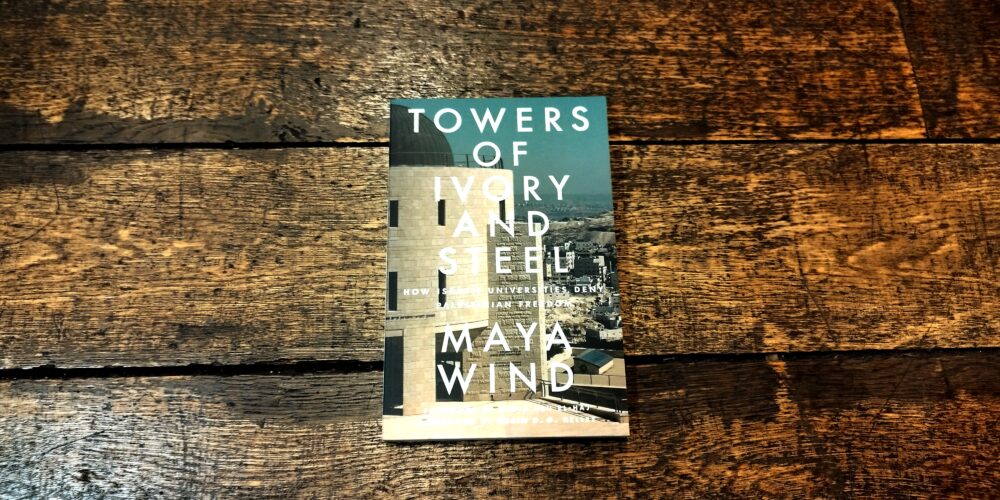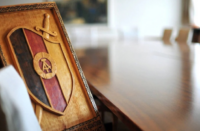Maya Wind’s Towers of Ivory and Steel: How Israeli Universities Deny Palestinian Freedom saw its Dublin launch at Trinity College, mere minutes after the Trinity students celebrated the end of their encampment. The book launch was a chance to contextualise the euphoria of one of the first wins for the student encampments in solidarity with Palestine, and position the role of academic institutions in the ongoing oppression of the Palestinian people, and settler colonialist regime on the Palestinian land.
Through the six chapters of this carefully researched volume, Wind systematically tells the tale of the Israeli academic institutions in the 20th and 21st century: a tale that predates the creation of the Israeli state. The institutions like the Hebrew University, Weizmann Institute and Technion were outposts of the Zionist project in time and space alike, advancing the “Judaization”, as Wind puts it, in the region and laying the ground for the new state. These institutions became, alongside others, the key points in the new military-industrial complex. As other authors like Antony Loewenstein, in The Palestine Laboratory: How Israel Exports The Technology of Occupation Around The World, have recorded in detail, this complex reliant on perpetual war away from home (much like its complementary complex of the US and NATO) sells technology of automated killing, surveillance, and torture as “battle-tested products”. Companies like Elbit are the most famous examples, and as the CEO of Elbit put on record, “The Technion is woven into Elbit’s DNA”: Israel’s leading universities are the research laboratories of the leading military corporations.
Of course, the role of universities in the “scholarly security state” (to borrow the term from Wind) does not stop at researching the next killer drone. Universities produce the intelligence, security, and army cadre, and oftentimes employ the operative personnel themselves. A Palestinian academic recently told me of an hours-long investigation in Israel they were subjected to: the interrogator was a fellow academic from an Israeli university. The integration of the university into the state apparatus is tight and all-encompassing. Wind borrows a striking illustration for this from Ilan Gur Zeev: the 31-story tall University of Haifa building towering over the (Palestinian-majority) land of Galilee. The roof of it was, until recently, manned by the army, hosting the critical telecommunications infrastructure. The top floor, just under the military boots, is where the university management sits; such are the ivory towers of Israel.
Again, this is not the only role universities of Israel play in the settler colonialist state. The system of oppression goes beyond the front line of security and army, and much of it relies on culture, ideology, and reputation. Universities engage in repression of Palestinian students, repression of critical voices, and creating a distorted narrative of occupation and oppression from the perspective of “the only liberal democracy in the Middle East”. This is the narrative of the “Middle East Studies” as the state project of propaganda for the international use. This project is complemented by the one promoting international Israeli research and teaching collaborations. Western institutions, by collaborating with Israeli institutions on projects seemingly unrelated to the settler colonialist programme, provide a fig leaf for the settler colonialism and normalise its actions.
Towers of Ivory and Steel makes for a great fact-rich read refuting commonly parroted claims from liberal western academia opposing boycott, divestment and sanctions (BDS) targeting Israeli universities. Oftentimes deliberately conflating boycott of individuals (useless and not called for) and boycott of institutions (as called for by PACBI, Palestinian Campaign for the Academic and Cultural Boycott of Israel), the opponents of cutting ties with Israeli institutions that provide the scaffold to the settler colonial state repeatedly invoke the concept of academic freedom. However, as Wind says at the end of her book, “there is no academic freedom until it applies to all”. Ireland’s trade unions organising university workers are adopting motions on cutting ties with Israeli institutions, student unions have already been leaders on this question, and the universities have started giving promises. It is vital to keep the pressure on and see the universities fulfil these promises, ending complicity in oppression and genocide; Towers of Ivory and Steel dares to show an emancipatory future of liberation beyond the horrible, unbearable status quo.
Towers of Ivory and Steel: How Israeli Universities Deny Palestinian Freedom (Verso Books, 2024) is available from Connolly Books, Temple Bar, Dublin






